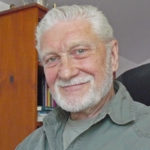© 2023 Mark Blackham
© 2023 International Urantia Association (IUA)
Mark Blackham, Canada

Welcome to the November 2023 edition of the Urantia Association’s Journal, a publication dedicated to the thoughts, observations, and experiences of Urantia Book students from around the world. Our contributors explore a wide range of topics related to the teachings of the book, all of which demonstrate an extraordinary diversity of thought and a spirited unity of purpose.
Our first article, “Urantia – Is It a New Religion?” by Peep Sõber brings up a question often asked by Urantia Book students and others. Peep recognizes there is an air of subjectivity to this question, depending on the individual and their experiences. Nonetheless, he drives home the point that both The Publication Mandate and The Urantia Book itself, promote a new religion, in particular, the religion of Jesus. But changing religion is not about forming a new church with a rigid set of beliefs, various clergy, or a claim to ecclesiastical authority.
Our second article is “Spiritual Practices – an Invitation to Intimacy with God” by Robert Coenraads. Robert suggests that most people do not want their beliefs to be limited to any particular creed and that the personal religious experience advocated in The Urantia Book, with its open-minded and intimate approach, is the best way to engage in meditative exercises. Robert points out that Eastern religions offer a very practical set of meditation practices and ideas that are useful to Urantia Book students. He compares these to some Judeo-Christian rituals and practices before delving into an exploration of the techniques suggested in The Urantia Book, namely meditation, prayer, and worship.
In the next article, Phillip Marriott addresses “Unity – Harmony Within Diversity of Experience and Belief.” More specifically, he looks at ways to encourage spirit unity among all believers. Phillip tells us of his encounter with an argumentative individual as a means to address solutions. Rather than taking a defensive stance with our beliefs, Phillip encourages us to look at the way Jesus approached differences of opinion, such as working through common ground and by embellishing the truth in others’ beliefs. The spirit unity of Jesus is best summed by the statement that “The unity of religious experience… derives from the identical nature of the God fragment indwelling the individual.” But as Phillip says, “it’s only going to work in an environment of co-operation in which there is a willingness to have peace and harmony.”
Our fourth article is “Urantia’s Unrevealed Destiny” by Neal Waldrop, who tackles the need for progressive changes in Urantia civilization and suggests methods by which these changes could be implemented. The revelators tell us that “Urantia society can never hope to settle down as in past ages,” and that it will, in fact, take a millennium for this to occur. This change, however, will require the religion of Jesus as a forceful and stabilizing influence.
Neal points out that Jesus, the Melchizedeks, and the angels are all concerned with the progressive growth of civilization on Urantia and suggest several ways it could be improved. His project, “The Global Endeavor” is intended to address ways to improve society. As a working model, he advocates using the organizational structure of the master seraphim of planetary supervision, thereby dividing our activities into twelve groups, each of which addresses ways to improve particular areas of social life. As to how these groups will function and succeed, much depends on the insights given by Jesus, particularly while on his Mediterranean tour and during his caravan trip to Urmia. Neal contends that enacting these changes will require innovators and original thinkers who can actually change the rules of society.
Our final article, “Our World Is Made of Force Fields” by Antti Roine, diverges from the spiritual and social themes of the preceding articles by taking a turn to the material realm. Antti suggests that much of the physical world around us is permeated with empty space, as is the entire universe. But within this “empty” space there are a number of force fields that have different effects on matter. Antti posits that science knows little about either the nature of matter or the force fields acting within it, and that much of accepted science is a belief system in itself. Based on the teachings of The Urantia Book, Antti reminds us that, “From the perspective of philosophical idealism, reality is ultimately spiritual in nature, and the materialistic world is only a shadow of the spiritual world.”